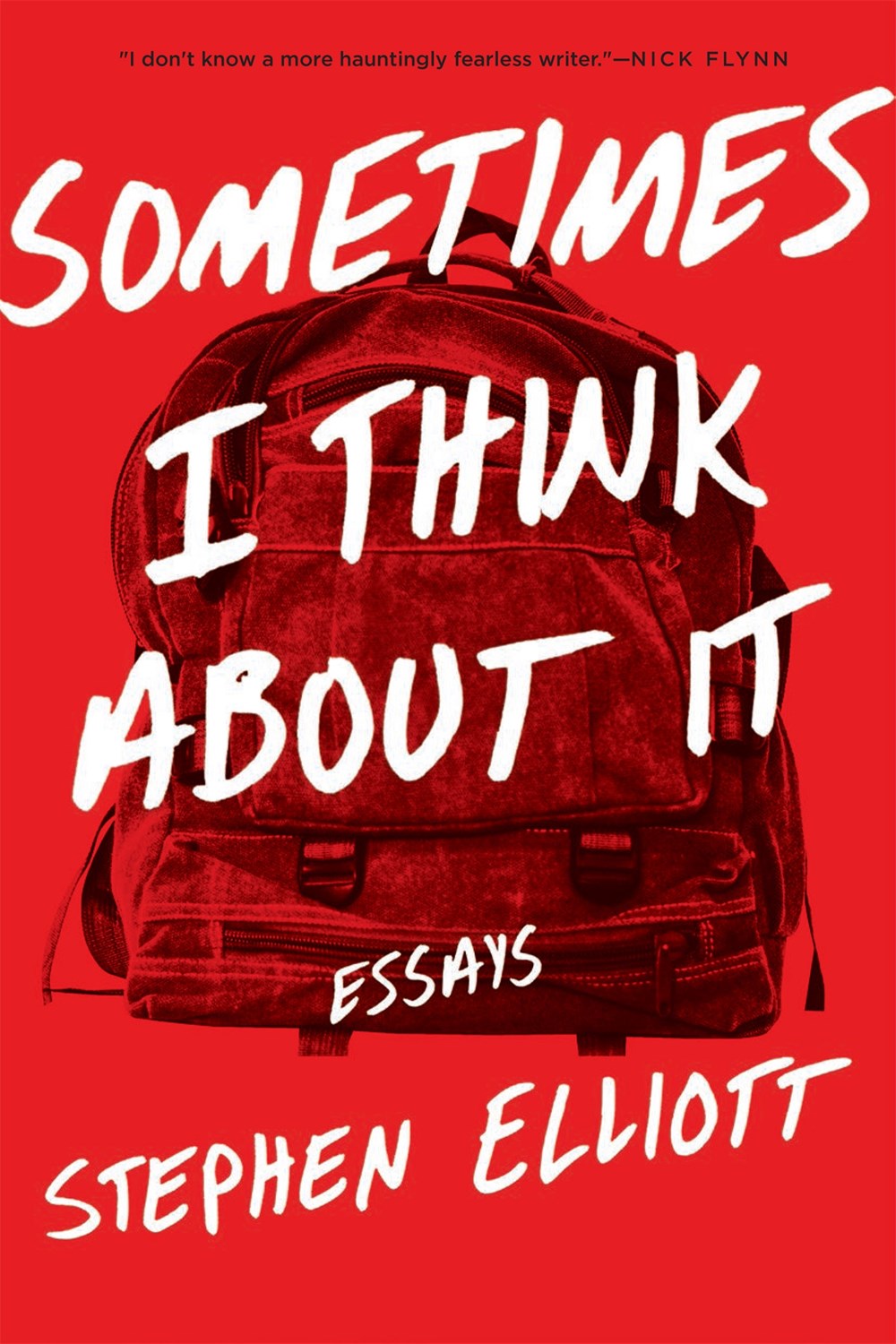Stephen Elliott discusses his new essay collection, Sometimes I Think About It.
Praise for Stephen Elliott
“I love these essays so hard I want to chew on them. For the bite of it. Stephen Elliott has the uncanny ability to go out into the culture and locate a self set loose from consumer culture and money identity. When it comes to outsider bodies and lives and stories, Stephen Elliott is there to remind us that the edges are where our cultural shape comes from. Without the edges, the center doesn't even exist. Sometimes I Think About It is an outsider tour de force.”?Lidia Yuknavitch
“Elliott may be writing under the influence, but it's the influence of genius.” ?Vanity Fair
“Elliott writes with a grace and precision that calls to mind Truman Capote's landmark work, In Cold Blood. He, too, is fascinated by questions of motive, how our capacity to love is disfigured into evil, and our tangled mechanisms of denial.” ?The Boston Globe
About Sometimes I Think About It
In Sometimes I Think About It, Stephen Elliott gathers personal essays, reportage, and profiles written over fifteen years to tell a powerful story about outsiders and underdogs.
Moving from the self to the civic, the book begins with a series of essays that trace Elliott’s childhood with an abusive and erratic father, his life on the streets as a teenager, and his growing interest in cross-dressing and masochism. These stories, which range from a comic portrait of a week spent hosting his younger brother to a brutal depiction of depression, provide a context for the essays that follow.
Stepping out into the world, Elliott tells of a man who loses his family in a rock slide in Southern California, explores the vexing realities of life in Palestine, and paints a chilling picture of a young man caught in the prison-industrial complex. The last section, “The Business of America Is Business,” shows Elliott’s abiding interest in the spectacle of money in America, from pop music to pornography to publishing, and it concludes with an off-kilter account of the tech industry’s assault on West Los Angeles.
Building on the extraordinary storytelling that characterized his breakout book, The Adderall Diaries, Elliott’s search for dignity and happiness leads him to tell with great sympathy the stories of those who are broken and seek to be whole.
show less
Praise for Stephen Elliott
“I love these essays so hard I want to chew on them. For the bite of it. Stephen Elliott has the uncanny ability to go out into the culture and locate a self set loose from consumer culture and money identity. When it comes to outsider bodies and lives and stories, Stephen Elliott is there to remind us that the edges are where our cultural shape comes from. Without the edges, the center doesn't even exist. Sometimes I Think About It is an outsider tour de force.”?Lidia Yuknavitch
“Elliott may be writing under the influence, but it's the influence of genius.” ?Vanity Fair
“Elliott writes with a grace and precision that calls to mind Truman Capote's landmark work, In Cold Blood. He, too, is fascinated by questions of motive, how our capacity to love is disfigured into evil, and our tangled mechanisms of denial.” ?The Boston Globe
About Sometimes I Think About It
In Sometimes I Think About It, Stephen Elliott gathers personal essays, reportage, and profiles written over fifteen years to tell a powerful story about outsiders and underdogs.
Moving from the self to the civic, the book begins with a series of essays that trace Elliott’s childhood with an abusive and erratic father, his life on the streets as a teenager, and his growing interest in cross-dressing and masochism. These stories, which range from a comic portrait of a week spent hosting his younger brother to a brutal depiction of depression, provide a context for the essays that follow.
Stepping out into the world, Elliott tells of a man who loses his family in a rock slide in Southern California, explores the vexing realities of life in Palestine, and paints a chilling picture of a young man caught in the prison-industrial complex. The last section, “The Business of America Is Business,” shows Elliott’s abiding interest in the spectacle of money in America, from pop music to pornography to publishing, and it concludes with an off-kilter account of the tech industry’s assault on West Los Angeles.
Building on the extraordinary storytelling that characterized his breakout book, The Adderall Diaries, Elliott’s search for dignity and happiness leads him to tell with great sympathy the stories of those who are broken and seek to be whole.
Stephen Elliott discusses his new essay collection, Sometimes I Think About It.
Praise for Stephen Elliott
“I love these essays so hard I want to chew on them. For the bite of it. Stephen Elliott has the uncanny ability to go out into the culture and locate a self set loose from consumer culture and money identity. When it comes to outsider bodies and lives and stories, Stephen Elliott is there to remind us that the edges are where our cultural shape comes from. Without the edges, the center doesn't even exist. Sometimes I Think About It is an outsider tour de force.”?Lidia Yuknavitch
“Elliott may be writing under the influence, but it's the influence of genius.” ?Vanity Fair
“Elliott writes with a grace and precision that calls to mind Truman Capote's landmark work, In Cold Blood. He, too, is fascinated by questions of motive, how our capacity to love is disfigured into evil, and our tangled mechanisms of denial.” ?The Boston Globe
About Sometimes I Think About It
In Sometimes I Think About It, Stephen Elliott gathers personal essays, reportage, and profiles written over fifteen years to tell a powerful story about outsiders and underdogs.
Moving from the self to the civic, the book begins with a series of essays that trace Elliott’s childhood with an abusive and erratic father, his life on the streets as a teenager, and his growing interest in cross-dressing and masochism. These stories, which range from a comic portrait of a week spent hosting his younger brother to a brutal depiction of depression, provide a context for the essays that follow.
Stepping out into the world, Elliott tells of a man who loses his family in a rock slide in Southern California, explores the vexing realities of life in Palestine, and paints a chilling picture of a young man caught in the prison-industrial complex. The last section, “The Business of America Is Business,” shows Elliott’s abiding interest in the spectacle of money in America, from pop music to pornography to publishing, and it concludes with an off-kilter account of the tech industry’s assault on West Los Angeles.
Building on the extraordinary storytelling that characterized his breakout book, The Adderall Diaries, Elliott’s search for dignity and happiness leads him to tell with great sympathy the stories of those who are broken and seek to be whole.
read more
Praise for Stephen Elliott
“I love these essays so hard I want to chew on them. For the bite of it. Stephen Elliott has the uncanny ability to go out into the culture and locate a self set loose from consumer culture and money identity. When it comes to outsider bodies and lives and stories, Stephen Elliott is there to remind us that the edges are where our cultural shape comes from. Without the edges, the center doesn't even exist. Sometimes I Think About It is an outsider tour de force.”?Lidia Yuknavitch
“Elliott may be writing under the influence, but it's the influence of genius.” ?Vanity Fair
“Elliott writes with a grace and precision that calls to mind Truman Capote's landmark work, In Cold Blood. He, too, is fascinated by questions of motive, how our capacity to love is disfigured into evil, and our tangled mechanisms of denial.” ?The Boston Globe
About Sometimes I Think About It
In Sometimes I Think About It, Stephen Elliott gathers personal essays, reportage, and profiles written over fifteen years to tell a powerful story about outsiders and underdogs.
Moving from the self to the civic, the book begins with a series of essays that trace Elliott’s childhood with an abusive and erratic father, his life on the streets as a teenager, and his growing interest in cross-dressing and masochism. These stories, which range from a comic portrait of a week spent hosting his younger brother to a brutal depiction of depression, provide a context for the essays that follow.
Stepping out into the world, Elliott tells of a man who loses his family in a rock slide in Southern California, explores the vexing realities of life in Palestine, and paints a chilling picture of a young man caught in the prison-industrial complex. The last section, “The Business of America Is Business,” shows Elliott’s abiding interest in the spectacle of money in America, from pop music to pornography to publishing, and it concludes with an off-kilter account of the tech industry’s assault on West Los Angeles.
Building on the extraordinary storytelling that characterized his breakout book, The Adderall Diaries, Elliott’s search for dignity and happiness leads him to tell with great sympathy the stories of those who are broken and seek to be whole.
show less
Date/Times:
1231 9th Avenue, San Francisco, CA 94111
The Best Events
Every Week in Your Inbox
From Our Sponsors
UPCOMING EVENTS
Great suggestion! We'll be in touch.
Event reviewed successfully.









